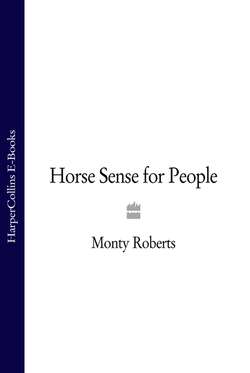Читать книгу Horse Sense for People - Monty Roberts - Страница 14
Two COMMUNICATION
ОглавлениеThe body language of horses offers profound lessons for communication between humans.
Communication is key to our success as human beings. Poor communication results in unrest, unhappiness, isolation and much more. The horse communicates through body language. With humans, body language plays an important role in determining what information we receive and how we are receiving it. Surprisingly, words play a relatively insignificant role in our interaction with people. Therefore nonverbal communication sends very strong messages, not only in the world of the equine and most other animal species, but also among humans.
If we feel comfortable around someone, we will naturally want to stay with him. By staying near him, we are likely to become more interested in him, his needs and desires. This is how we influence people.*” Scientific evidence allows us to assume that about 80 percent of communication between humans is body language. When compared with words, body language cues are imprinted more deeply in the human memory bank. Tone of voice is the next most influential part of communication and words make up the rest. This compares favorably with the horse’s communication system. Horses communicate extensively and almost entirely using body language: they do make noises, but in the natural environment, silence is paramount, because no member of the herd wants to alert predators. The horse’s highly developed senses of smell and eyesight play an important part in their communication.
The dictionary definition of communication is an act or instance of transmitting information. But communication is so much more than that. What are we trying to do when we communicate with people? We are looking for physical, emotional and spiritual families. We are looking for like-minded people who will reduce our sense of isolation in an increasingly complex world. The horse knows that, in his world, isolation means certain death. People, by contrast, can often intentionally isolate themselves from other humans. Though they can survive quite well, isolation can have negative consequences. In large cities for example, fear for one’s safety tends to create a desire to isolate oneself using bigger and bigger locks and more and more security, creating an environment of isolation within the mass of humanity. And often people in isolation lose confidence both socially and in the workplace. Stress and loneliness rise and isolation can create a sense of vulnerability.
The badly behaved foal that has been sent out of the herd knows that he cannot survive alone without the protection provided by the group. The isolated horse is at risk. The elderly or infirm horse unable to sustain the pace of the family lags behind and is soon harvested by predators. The horse knows that isolation is an unhealthy state, whereas the human seems to be unaware of the potential dangers of solitary confinement, even when it’s by choice.
Animals use a sophisticated interspecies communication system in order to survive. They assist each other, protect and communicate in a way man has yet to learn. Animals do not form subversive groups that terrorize the neighborhood as humans have learned to do. To be isolated is not to be part of a community, not to belong. Isolation is a revolt against all the things society has to offer. The more people find themselves in situations where isolation is encouraged, accepted and endured, the more anger, shame and fear they will feel. And reactions such as violent crime will surely be a result. We need to improve our communication with the less fortunate of our society and learn to speak the language they understand, as I have with the horse.
When I induce the horse to circle the round pen I am saying, “I am giving you an opportunity to choose for yourself. Flee if that is what you feel is best for you.” I want the horse to be free to choose his own course because in that state of mind learning is encouraged. Through communication, I play out the role of predator and await the gestures appropriate to renegotiation. When the horse exercises his option to come to me rather than go away, I welcome him as strongly as I can in the language of Equus. I reinforce his choice so that we can work together in harmony. It is my hope that we can go forward from that point in the certain knowledge that we mean no harm to one another.
